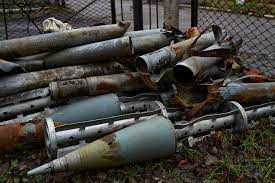Africa’s last independent state becomes the 112th country to join this international humanitarian and disarmament treaty, which completely bans the use, production, stockpiling and transfer of this category of weapons, and provides for their clearance and destruction.
A cluster bomb takes the form of a container filled with explosive mini-bombs known as cluster ammunition. The container may be a grenade, a rocket, a missile, etc. Dropped by air or land, it opens in flight and releases the sub munitions. A veritable carpet of bombs then falls without precision over large areas.
According to the NGO Handicap International, up to 40 percent of cluster ammunition fail to explode when they hit the ground: either they are too light, the ground is too soft, or a malfunction prevents them from exploding. While still active, these cluster ammunition become as dangerous as anti-personnel mines. They can explode at any time, even with the slightest manipulation. Entire areas become uninhabitable, hampering the resumption of social and economic life and forcing populations to move.
Explosive remnants of war pose a threat to civilians, sometimes decades after a conflict has ended. Civilians account for 97 percent of recorded casualties, 66 percent of whom are children. “By banning cluster bombs, South Sudan is taking an important step toward strengthening international peace and security,” said Mary Wareham, deputy arms director at Human Rights Watch and chair of the cluster ammunition coalition, quoted in a statement released Monday.
According to Ms. Wareham, “other countries should follow South Sudan’s lead, as preventing further use of cluster munitions is a humanitarian and human rights imperative.”
Juba acceded to the International Convention on Cluster Munitions on August 3, 2023. It had expressed interest in joining the Convention since it became an independent state on July 9, 2011. The Executive Council of Ministers unanimously approved its accession to the convention in 2017, and referred the matter to Parliament for legislative approval.
South Sudan has participated in formal meetings of the Convention as an observer since 2011. It acceded to the international treaty banning anti-personnel mines on November 11, 2011, through the “succession” process after gaining independence from Sudan.
Juba has also submitted voluntary transparency reports to the Convention in 2020 and 2021. These confirm that it has no stockpiles of cluster munitions. In 2014, it declared that it had not produced cluster munitions and had no intention of acquiring or using them.
South Sudan’s National Mine Action Authority should step up its efforts to clear cluster munition remnants and assist cluster munition victims, Human Rights Watch said.
In addition to the 112 States Parties to the Convention on Cluster Munitions, which entered into force on 1 August 2010, an additional 12 States have signed but not yet ratified the Convention. Nigeria was the first country to ratify the Convention, on February 28, 2023.
Eight of the signatory countries that have not ratified the Convention are in Africa: Angola, Central African Republic, Democratic Republic of the Congo, Djibouti, Kenya, Liberia, Tanzania, and Uganda. The others are Cyprus, Haiti, Indonesia, and Jamaica.
Ten other African countries have not signed the Convention: Algeria, Egypt, Equatorial Guinea, Eritrea, Ethiopia, Gabon, Libya, Morocco, Sudan and Zimbabwe.
ARD/ac/lb/abj/APA


